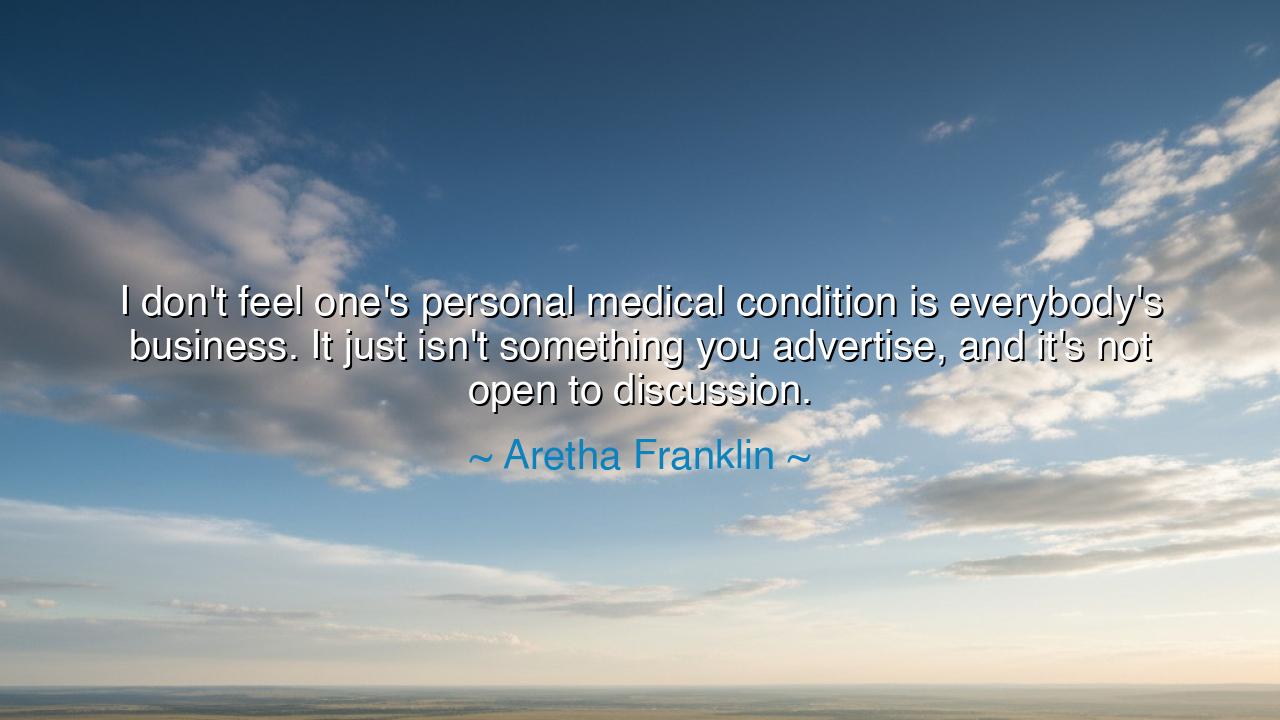
I don't feel one's personal medical condition is everybody's
I don't feel one's personal medical condition is everybody's business. It just isn't something you advertise, and it's not open to discussion.






When Aretha Franklin declared, “I don’t feel one’s personal medical condition is everybody’s business. It just isn’t something you advertise, and it’s not open to discussion,” she spoke with the dignity of a queen who understood that privacy is power, and that some truths belong only to the soul that bears them. Her words were not born of secrecy, but of sovereignty — the understanding that one’s body, one’s suffering, and one’s healing are sacred matters. In a world that feasts upon curiosity and thrives on exposure, Franklin’s voice rose like that of the ancients, reminding us that modesty and mystery are not weaknesses, but shields of strength and self-respect. Her statement is not defiance; it is wisdom — the wisdom to know that not everything true must be shared, and not everything shared remains true.
For Aretha Franklin, this truth was personal. Throughout her life, she was both adored and scrutinized, celebrated for her voice but pursued for her vulnerabilities. When illness came — as it comes for all — the world’s hunger for answers sought to pierce the veil of her silence. But Franklin, regal in both spirit and stance, refused to let her private pain become public property. She understood that the body is a temple, and not every temple must be entered by every pilgrim. Her silence was not secrecy but sanctity — a way of preserving her dignity in the face of a world that often confuses transparency with truth. In this, she carried herself as the ancients taught: with honor in restraint and grace in privacy.
The origin of her wisdom lies in an older, nobler understanding of the self — one that predates our modern hunger for exposure. In the ancient world, ailments of the body were treated with reverence, for they were seen as the struggles of the spirit. Among the Greeks, the sick were tended in temples of Asclepius, where healing was a sacred rite performed in silence. The body’s suffering was never for spectacle; it was a private covenant between the mortal and the divine. Franklin’s words echo that ancient reverence: that one’s medical condition, one’s pain, is not for public consumption, but for personal understanding and healing. She stands, then, as a modern oracle, reminding us that some truths lose their sanctity when shouted from the rooftops.
Her stance calls to mind another who carried the weight of illness with quiet dignity — Frida Kahlo, the painter of pain. Though Kahlo’s art revealed her suffering, she did not live to appease the world’s curiosity about her condition. Her body, broken by accidents and surgeries, became both canvas and shield. What she shared was not for pity, but for power — to transform pain into beauty on her own terms. Like Franklin, she drew a line between vulnerability and exposure. Both women understood that while the world may crave details, the soul requires protection. To withhold the private truth of one’s suffering is not shame; it is a declaration of ownership over one’s life and story.
In Franklin’s words, there also lies a warning for the modern age. We live in a time when people are encouraged to share every wound, every weakness, every scar for validation. Yet, as she reminds us, not every truth needs to be spoken aloud to be real. There is strength in silence — not the silence of fear, but the silence of control. When you keep certain parts of yourself private, you preserve the mystery that gives meaning to identity. To speak everything is to leave nothing sacred; to share everything is to surrender the boundaries that make you whole. The ancients would have said, “Guard what is holy.” Franklin says the same in her own way: Guard your dignity, your body, your story — for they are treasures, not trophies.
There is also compassion in her message. To refuse discussion of one’s illness is not to reject others’ concern, but to remind them that empathy does not require intrusion. True respect is found in honoring another’s silence, in understanding that love listens even when no words are given. Franklin’s wisdom teaches us to resist the modern impulse to pry, to remember that care is best expressed through patience and presence, not demand for details. Her boundary was not a wall; it was a garden fence, marking where her humanity could breathe without being trampled by public gaze.
And so, let this teaching endure: hold your privacy as sacred armor. When life wounds you — through illness, failure, or sorrow — you owe no explanation to the crowd. Speak if you wish, but know that silence is also speech, and that dignity can live quietly. Respect yourself, as Aretha Franklin’s mother taught her, and never allow others to turn your pain into spectacle. Respect, too, the privacy of others; ask not what is not freely offered. For in this mutual restraint lies the deepest form of empathy — a respect for the unseen burdens of others and the sanctity of your own soul.
Thus, as the ancients would counsel: guard what is precious, and speak only what serves truth and healing. Your body is your temple; your silence, your sovereignty. In her regal wisdom, Aretha Franklin reminds us that some parts of the self are meant to remain veiled, not out of fear, but out of reverence — because even in an age that demands to know everything, the soul still deserves the grace of mystery.






AAdministratorAdministrator
Welcome, honored guests. Please leave a comment, we will respond soon